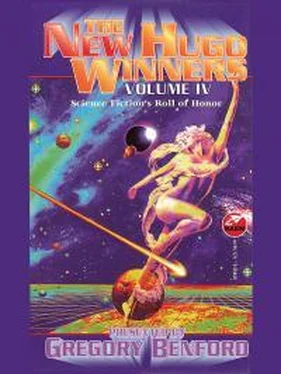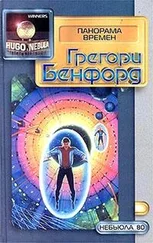Грегори Бенфорд - The New Hugo Winners - Volume IV
Здесь есть возможность читать онлайн «Грегори Бенфорд - The New Hugo Winners - Volume IV» весь текст электронной книги совершенно бесплатно (целиком полную версию без сокращений). В некоторых случаях можно слушать аудио, скачать через торрент в формате fb2 и присутствует краткое содержание. Год выпуска: 1997, ISBN: 1997, Издательство: Baen, Жанр: Фантастика и фэнтези, на английском языке. Описание произведения, (предисловие) а так же отзывы посетителей доступны на портале библиотеки ЛибКат.
- Название:The New Hugo Winners - Volume IV
- Автор:
- Издательство:Baen
- Жанр:
- Год:1997
- ISBN:0-671-87852-2
- Рейтинг книги:5 / 5. Голосов: 1
-
Избранное:Добавить в избранное
- Отзывы:
-
Ваша оценка:
- 100
- 1
- 2
- 3
- 4
- 5
The New Hugo Winners - Volume IV: краткое содержание, описание и аннотация
Предлагаем к чтению аннотацию, описание, краткое содержание или предисловие (зависит от того, что написал сам автор книги «The New Hugo Winners - Volume IV»). Если вы не нашли необходимую информацию о книге — напишите в комментариях, мы постараемся отыскать её.
The New Hugo Winners - Volume IV — читать онлайн бесплатно полную книгу (весь текст) целиком
Ниже представлен текст книги, разбитый по страницам. Система сохранения места последней прочитанной страницы, позволяет с удобством читать онлайн бесплатно книгу «The New Hugo Winners - Volume IV», без необходимости каждый раз заново искать на чём Вы остановились. Поставьте закладку, и сможете в любой момент перейти на страницу, на которой закончили чтение.
Интервал:
Закладка:
"I agree."
"What we must do, then, and this is off the top of my head, is to have the Emotional expand, the draperies move out and enswathe (if that's the word) both Parental and Rational. They are obscured by the draperies and we don't see exactly how it's done but they get closer and closer until they superimpose."
"We'll have to emphasize the drapery," said Cathcart. "We'll have to make it as graceful as possible in order to get across the beauty of it, and not just the eroticism. We'll have to have music."
"Not the Romeo and Juliet overture, please. A slow waltz, perhaps, because the melting takes a long time. And not a familiar one. I don't want the audience humming along with it. In fact, it would be best if it comes in occasional bits so that the audience gets the impression of a waltz, rather than actually hearing it."
"We can't see how to do it, until we try it and see what works."
"Everything I say now is a first-order suggestion that may have to be yanked about this way and that under the pressure of actual events. And what about the orgasm? We'll have to indicate that somehow."
"Color."
"Hmm."
"Better than sound, Jonas. You can't have an explosion. I wouldn't want some kind of eruption, either. Color. Silent color. That might do it."
"What color? I don't want a blinding flash, either."
"No. You might try a delicate pink, very slowly darkening, and then toward the end suddenly becoming a deep, deep red."
"I'm not sure. We'll have to try it out. It must be unmistakable and moving and not make the audience giggle or feel embarrassed. I can see ourselves running through every color change in the spectrum, and, in the end, finding that it will depend on what you do subliminally. And that brings us to the triple-beings."
"The what?"
"You know. After the last melting, the superimposition remains permanent and we have the adult form that is all three components together. There, I think, we'll have to make them more human. Not human, mind you. Just more human. A faint suggestion of human form, not just subliminal, either. We'll need a voice that is somehow reminiscent of all three, and I don't know how the recorder can make that work. Fortunately, the triple-beings don't appear much in the story."
Willard shook his head. "And that brings us to the rough fact that the compu-drama might not be a possible project at all."
"Why not? You seem to have been offering potential solutions of all kinds for the various problems."
"Not for the essential part. Look! In King Lear, we had human characters, more than human characters. You had searing emotions. What have we got here? We have funny little cubes and ovals and drapery. Tell me how my Three in One is going to be different from an animated cartoon?"
"For one thing, an animated cartoon is two-dimensional. Even with elaborate animation it is flat, and its coloring is without shading. It is invariably satirical—"
"I know all that. That's not what I want you to tell me. You're missing the important point. What a compu-drama has, that a mere animated cartoon does not, are subliminal suggestions such as can only be created by a complex computer in the hands of an imaginative genius. What my compu-drama has that an animated cartoon doesn't is you, Meg."
"Well, I was being modest."
"Don't be. I'm trying to tell you that everything— everything —is going to depend on you. We have a story here that is dead serious. Our Emotional is trying to save Earth out of pure idealism; it's not her world. And she doesn't succeed, and she won't succeed in my version, either. No cheap, happy ending."
"Earth isn't exactly destroyed."
"No, it isn't. There's still time to save it if Laborian ever gets around to doing a sequel, but in this story the attempt fails. It's a tragedy and I want it treated as one—as tragic as Lear. No funny voices, no humorous actions, no satirical touches. Serious. Serious. Serious. And I'm going to depend on you to make it so. It will be you who makes sure that the audience reacts to the Rational, the Emotional, the Parental, as though they were human beings. All their peculiarities will have to melt away and they'll have to be recognized as intelligent beings on a par with humanity, if not ahead of it. Can you do it?"
Cathcart said dryly, "It looks as though you will insist I can."
"I do so insist."
"Then you had better see about getting the ball rolling, and you leave me alone while you're doing it. I need time to think. Lots of time."
The early days of the shooting were an unmitigated disaster. Each member of the crew had his copy of the book, carefully, almost surgically trimmed, but with no scenes entirely omitted.
"We're going to stick to the course of the book as closely as we can, and improve it as we go along just as much as we can," Willard had announced confidently. "And the first thing we do is get a hold on the triple-beings."
He turned to the head voice-recorder. "How have you been working on that?"
"I've tried to fuse the three voices."
"Let's hear. All right, everyone quiet."
"I'll give you the Parental first," said the recorder. There came a thin, tenor voice, out of key with the blockish figure that the Image man had produced. Willard winced slightly at the mismatch, but the Parental was mismatched—a masculine mother. The Rational, rocking slowly back and forth, had a somewhat self-important voice; enunciation over-careful, and it was a light baritone.
Willard interrupted. "Less rocking in the Rational. We don't want the audience to become seasick. He rocks when he is deep in thought, and not all the time."
He then nodded his head at Dua's draperies, which seemed quite successful, as did her clear and infinitely sweet soprano voice.
"She must never shriek," said Willard, severely, "not even when she is in a passion."
"She won't," said the recorder. "The trick is, though, to blend the voices in setting up the triple-being, in having each one distantly identifiable."
All three voices sounded softly, the words not clear. They seemed to melt into each other and then the voice could be heard enunciating.
Willard shook his head in immediate discontent. "No, that won't do at all. We can't have three voices in a kind of intimate patchwork. We'd be making the triple-being a figure of fun. We need one voice which somehow suggests all three."
The voice-recorder was clearly offended. "It's easy to say that. How do you suggest we do it?"
"I do it," said Willard, brutally, "by ordering you to do it. I'll tell you when you have it. And Cathcart—where is Cathcart?"
"Here I am," she said, emerging from behind her instrumentation. "Where I'm supposed to be."
"I don't like the sublimination, Cathcart. I gather you tried to give the impression of cerebral convolutions."
"For intelligence. The triple-beings represent the intelligence-peak of these aliens."
"Yes, I understand, but what you managed to do was to give the impression of worms. You'll have to think of something else. And I don't like the appearance of the triple-being, either. He looks just like a big Rational."
"He is like a big Rational," said one of the imagists.
"Is he described in the book that way?" asked Willard, sharply.
"Not in so many words, but the impression I get—"
"Never mind your impression. I'll make the decisions."
Willard grew fouler-tempered as the day wore on. At least twice he had difficulty controlling his passion, the second time coming when he happened to notice someone watching the proceedings from a spot at one edge of the lot.
He strode toward him angrily. "What are you doing here?"
It was Laborian, who answered quietly, "Watching."
Читать дальшеИнтервал:
Закладка:
Похожие книги на «The New Hugo Winners - Volume IV»
Представляем Вашему вниманию похожие книги на «The New Hugo Winners - Volume IV» списком для выбора. Мы отобрали схожую по названию и смыслу литературу в надежде предоставить читателям больше вариантов отыскать новые, интересные, ещё непрочитанные произведения.
Обсуждение, отзывы о книге «The New Hugo Winners - Volume IV» и просто собственные мнения читателей. Оставьте ваши комментарии, напишите, что Вы думаете о произведении, его смысле или главных героях. Укажите что конкретно понравилось, а что нет, и почему Вы так считаете.








